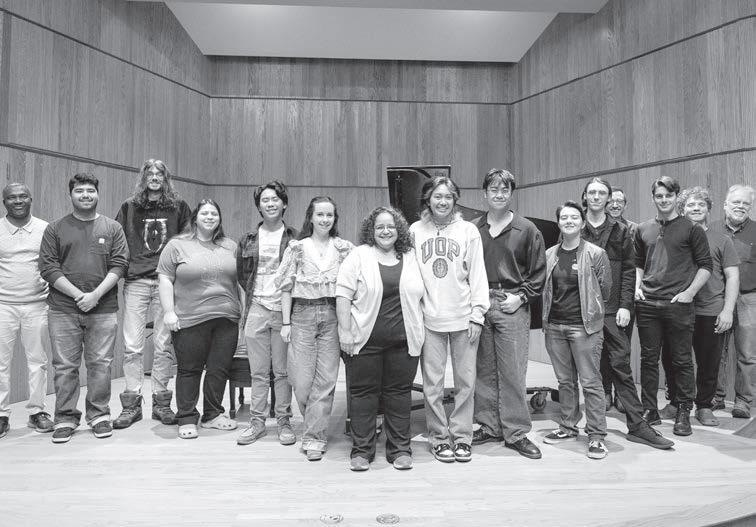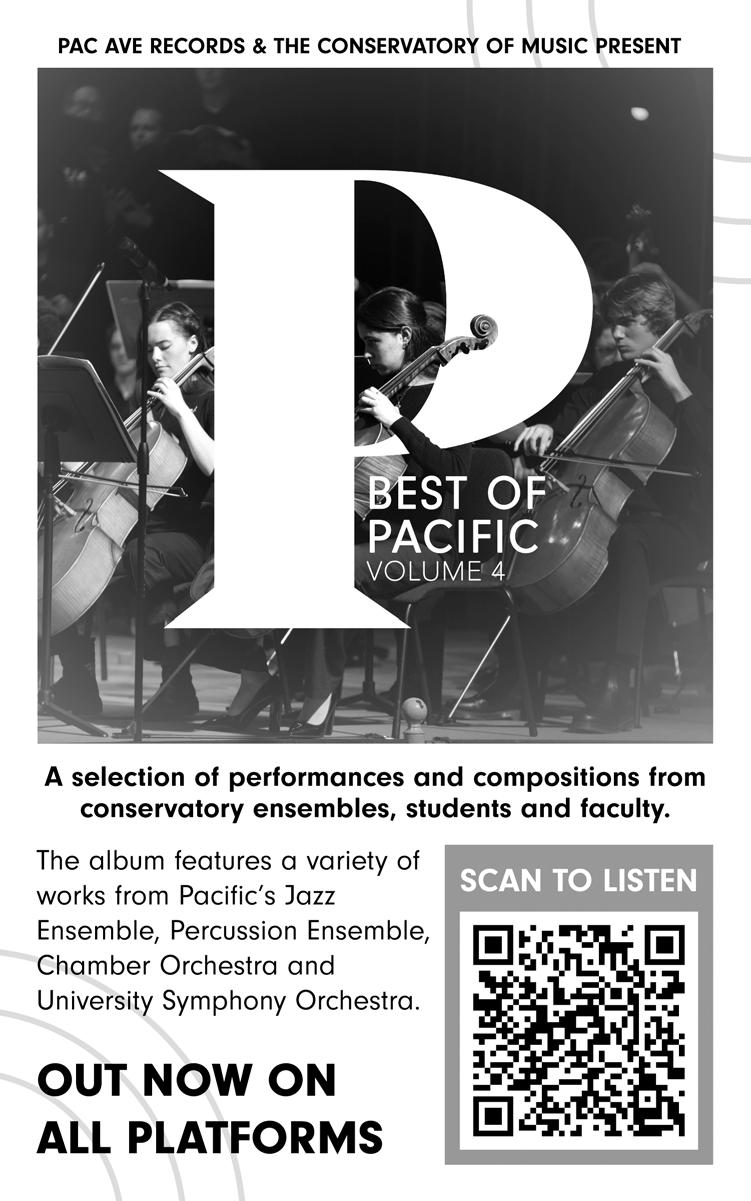
2025 FALL PREMIERS


2025 FALL PREMIERS
Featuring original works by Pacific student composers: Connor Hsu, Edmund Bascon, Henrie Notley, Elijah Atchley, Michael Shove, and Alayna Ontai
Performers are listed inside the program.
Friday, December 5, 2025
7:30 pm
Recital Hall



Two Shades of Brass (2025) Blues Rush Hour
Alayna Ontai and Amalia Silva, trumpets
Ciera Alkhoury, horn
Radley Rutledge, trombone
Seth Morris, tuba
Alia Kuhnert, trumpet
Jas Lopez, horn
William Giancaterino, trombone
Matthew Young, bass trombone
Connor Hsu (b. 2006)
Henrie Notley, alto flute
Elijah Atchley, double bass
Henrie Notley (b. 2007)
Two Thoughts (2025)
Henrie Notley, flute
Elijah Atchley, double bass
Elijah Atchley (b. 2006)
String Quartet (2025)
Windy
Michael Shove (b. 2000)
Alizon Lopez and Julianna Ramirez, violins
Erick Sariles, viola
Nicholas Trobaugh, cello
Shifting Tides (2025)
Henrie Notley, flute
Gabriel Jarata, oboe
Mitchell Amos, clarinet
Lily Walter, horn
Enrique Valdez, bassoon
Alayna Ontai (b. 2004)
A Q&A discussion with the composers will begin immediately after the concert concludes.
Notes by the composers.
Composed for brass quintet, Two Shades of Brass is a two-part piece with jazz influences. The first movement, “Blues,” is exactly what its name suggests—a slow, laid-back groove that passes the melody back and forth between instruments. In the second movement, "Rush Hour," the hurried pace of beginning a new day is depicted in a lively and upbeat manner.
Since I’ve only really worked with strings and piano, I wrote it to experiment with instruments I haven’t worked with before. Hearing them up close for the first time, I was definitely surprised by how powerful they could be. Overall, I really enjoyed working with brass performers, and learned a lot of valuable skills.
Meditation is a piece about distraction and focus. About a year ago, one of my music history classes focused on medieval music and Gregorian chant, and I wanted to write a melody that emulated some of those qualities. From the opening bar, I wanted to create a sense of relaxation. The beginning feels like sitting down after a long day, closing my eyes, and just breathing in and out. As all meditation sessions go, distraction sets in and the piece wanders in a different direction. Eventually, after some effort, the music finds its way back to a powerful, unitary focus.
When writing this piece, I had two main ideas: I wanted to use harmonics on the double bass and I wanted to use Dorian harmonies. The combination of these two elements results in a very unique texture. This piece is meant to take the listener on a journey to a magical fantasy world of their own imagination.
Atchley: Two Thoughts
This piece features two contrasting main sections that are bridged by an exploratory interlude. The piece starts peacefully with a melody first conceived in a bout of late-night shower opera. It then transitions to this fever dream-like interlude followed by a darker swampy soundscape. The piece as a whole is an exercise in creating solutions to the many challenges that come with writing within the limitations of my given instrumentation, the performers’ playing ability, and the challenge of transitioning between two wildly different soundscapes.
This piece started like most of mine on piano. Upon presenting it to my composition professor, he said, “that’s a string quartet,” so I turned it into that. I showed it to a friend, and she described it as “windy.” She also described it as “walking around drunk in Paris,” but the former made a better title. I’m contemplating this to be the second movement of a larger piece.
Shifting Tides was written as an exploration of harmonic motion. When writing this piece, I wanted to explore different compositional techniques than I had previously, leading me to dive deep into the inner workings of harmony. As a result, this work is different than many of the other pieces in my catalog, and a bit of a challenge for me to write. The name was derived from the opening statement, which reoccurs throughout, as the harmonic movement ebbs and flows much like the tide. As you are listening, try to picture the waves washing up on the sand of the beach.
Pacific's Music Composition Program is a fully immersive and broad major which will position you well to navigate this ever-evolving field of music. You will spend extensive time writing works for a variety of ensembles, learning a broad range of compositional techniques and honing your own compositional voice. You will compose for solo instruments, small ensembles, voice, chorus, percussion, digital media and larger musical forces such as orchestra and band. Specialized studies in orchestration, contemporary performance techniques, electronic music and film scoring will add crucial skills to your creative tool kit.
Our graduates are positioned to succeed. Many have gone on to attend top graduate programs and have pursued successful careers in the commercial music and media industries, as well as in the fields of academia and education. Several have received major honors, including Emmy Awards, Guggenheim Fellowships and Fulbright Grants.
Composition Faculty
Andrew Conklin, program director
Hendel Almetus
Eric Wood

Every gift to the Conservatory from an alum, parent, or friend makes an impact on our students. Our students rely on your generosity to enable them to experience a superior education.
Please contact the Assistant Dean for Development at 209.932.2978 to make a gift today. You may also send a check payable to University of the Pacific: Conservatory of Music, University of the Pacific Attn: Assistant Dean for Development 3601 Pacific Avenue Stockton, CA 95211




To view our upcoming events, scan the QR code or visit Pacific.edu/MusicEvents.